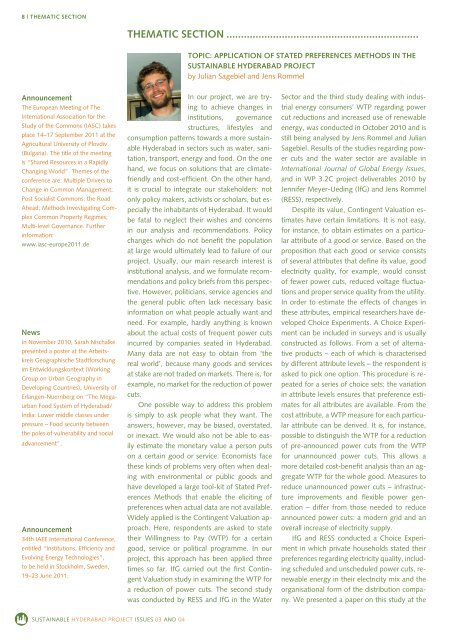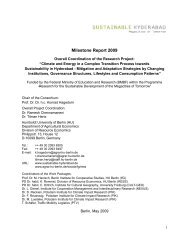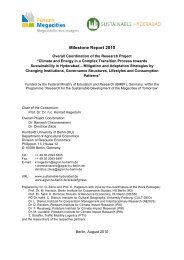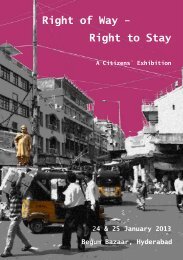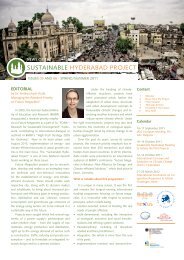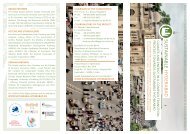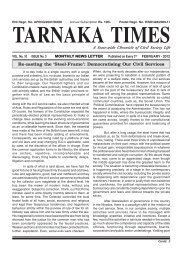SUSTAINABLE HYDERABAD PROJECT
SUSTAINABLE HYDERABAD PROJECT
SUSTAINABLE HYDERABAD PROJECT
You also want an ePaper? Increase the reach of your titles
YUMPU automatically turns print PDFs into web optimized ePapers that Google loves.
8 | THEMATIC SECTION EDITORIAL<br />
THEMATIC SECTION...................................................................<br />
TOPIC: APPLICATION OF STATED PREFERENCES METHODS IN THE<br />
<strong>SUSTAINABLE</strong> <strong>HYDERABAD</strong> <strong>PROJECT</strong><br />
by Julian Sagebiel and Jens Rommel<br />
Announcement<br />
The European Meeting of The<br />
International Association for the<br />
Study of the Commons (IASC) takes<br />
place 14–17 September 2011 at the<br />
Agricultural University of Plovdiv<br />
(Bulgaria). The title of the meeting<br />
is “Shared Resources in a Rapidly<br />
Changing World”. Themes of the<br />
conference are: Multiple Drivers to<br />
Change in Common Management;<br />
Post Socialist Commons: the Road<br />
Ahead; Methods Investigating Complex<br />
Common Property Regimes;<br />
Multi-level Governance. Further<br />
information:<br />
www.iasc-europe2011.de<br />
News<br />
In November 2010, Sarah Nischalke<br />
presented a poster at the Arbeitskreis<br />
Geographische Stadtforschung<br />
im Entwicklungskontext (Working<br />
Group on Urban Geography in<br />
Developing Countries), University of<br />
Erlangen-Nuernberg on “The Megaurban<br />
Food System of Hyderabad/<br />
India: Lower middle classes under<br />
pressure – Food security between<br />
the poles of vulnerability and social<br />
advancement”.<br />
Announcement<br />
34th IAEE International Conference,<br />
entitled “Institutions, Efficiency and<br />
Evolving Energy Technologies”,<br />
to be held in Stockholm, Sweden,<br />
19–23 June 2011.<br />
In our project, we are trying<br />
to achieve changes in<br />
institutions, governance<br />
structures, lifestyles and<br />
consumption patterns towards a more sustainable<br />
Hyderabad in sectors such as water, sanitation,<br />
transport, energy and food. On the one<br />
hand, we focus on solutions that are climatefriendly<br />
and cost-efficient. On the other hand,<br />
it is crucial to integrate our stakeholders: not<br />
only policy makers, activists or scholars, but especially<br />
the inhabitants of Hyderabad. It would<br />
be fatal to neglect their wishes and concerns<br />
in our analysis and recommendations. Policy<br />
changes which do not benefit the population<br />
at large would ultimately lead to failure of our<br />
project. Usually, our main research interest is<br />
institutional analysis, and we formulate recommendations<br />
and policy briefs from this perspective.<br />
However, politicians, service agencies and<br />
the general public often lack necessary basic<br />
information on what people actually want and<br />
need. For example, hardly anything is known<br />
about the actual costs of frequent power cuts<br />
incurred by companies seated in Hyderabad.<br />
Many data are not easy to obtain from ‘the<br />
real world’, because many goods and services<br />
at stake are not traded on markets. There is, for<br />
example, no market for the reduction of power<br />
cuts.<br />
One possible way to address this problem<br />
is simply to ask people what they want. The<br />
answers, however, may be biased, overstated,<br />
or inexact. We would also not be able to easily<br />
estimate the monetary value a person puts<br />
on a certain good or service. Economists face<br />
these kinds of problems very often when dealing<br />
with environmental or public goods and<br />
have developed a large tool-kit of Stated Preferences<br />
Methods that enable the eliciting of<br />
preferences when actual data are not available.<br />
Widely applied is the Contingent Valuation approach.<br />
Here, respondents are asked to state<br />
their Willingness to Pay (WTP) for a certain<br />
good, service or political programme. In our<br />
project, this approach has been applied three<br />
times so far. IfG carried out the first Contingent<br />
Valuation study in examining the WTP for<br />
a reduction of power cuts. The second study<br />
was conducted by RESS and IfG in the Water<br />
Sector and the third study dealing with industrial<br />
energy consumers’ WTP regarding power<br />
cut reductions and increased use of renewable<br />
energy, was conducted in October 2010 and is<br />
still being analysed by Jens Rommel and Julian<br />
Sagebiel. Results of the studies regarding power<br />
cuts and the water sector are available in<br />
International Journal of Global Energy Issues,<br />
and in WP 3.2C project deliverables 2010 by<br />
Jennifer Meyer-Ueding (IfG) and Jens Rommel<br />
(RESS), respectively.<br />
Despite its value, Contingent Valuation estimates<br />
have certain limitations. It is not easy,<br />
for instance, to obtain estimates on a particular<br />
attribute of a good or service. Based on the<br />
proposition that each good or service consists<br />
of several attributes that define its value, good<br />
electricity quality, for example, would consist<br />
of fewer power cuts, reduced voltage fluctuations<br />
and proper service quality from the utility.<br />
In order to estimate the effects of changes in<br />
these attributes, empirical researchers have developed<br />
Choice Experiments. A Choice Experiment<br />
can be included in surveys and is usually<br />
constructed as follows. From a set of alternative<br />
products – each of which is characterised<br />
by different attribute levels – the respondent is<br />
asked to pick one option. This procedure is repeated<br />
for a series of choice sets; the variation<br />
in attribute levels ensures that preference estimates<br />
for all attributes are available. From the<br />
cost attribute, a WTP measure for each particular<br />
attribute can be derived. It is, for instance,<br />
possible to distinguish the WTP for a reduction<br />
of pre-announced power cuts from the WTP<br />
for unannounced power cuts. This allows a<br />
more detailed cost-benefit analysis than an aggregate<br />
WTP for the whole good. Measures to<br />
reduce unannounced power cuts – infrastructure<br />
improvements and flexible power generation<br />
– differ from those needed to reduce<br />
announced power cuts: a modern grid and an<br />
overall increase of electricity supply.<br />
IfG and RESS conducted a Choice Experiment<br />
in which private households stated their<br />
preferences regarding electricity quality, including<br />
scheduled and unscheduled power cuts, renewable<br />
energy in their electricity mix and the<br />
organisational form of the distribution company.<br />
We presented a paper on this study at the<br />
<strong>SUSTAINABLE</strong> <strong>HYDERABAD</strong> <strong>PROJECT</strong> ISSUES 03 AND 04


